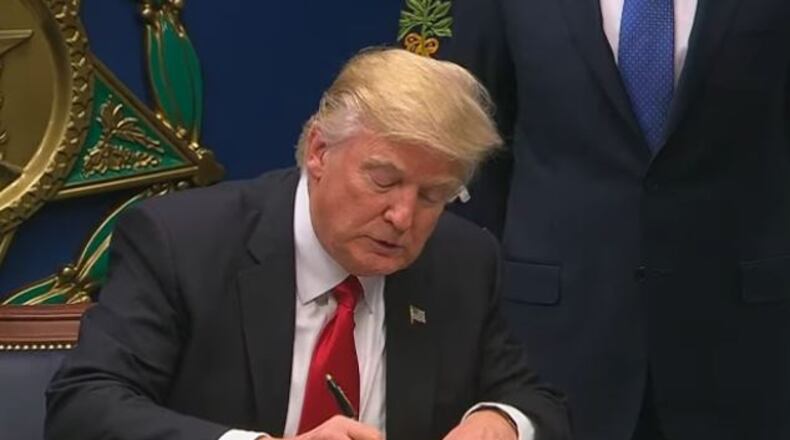From New York, NY -
The battle over President Donald Trump's executive order to restrict the admission of certain refugees into the U.S. flared in both legal and political circles on this Saturday, as lawyers tried to free up to a dozen people detained at JFK Airport outside this city, and critics in Congress denounced the President's move.
"It's not a Muslim ban, it's working out very nicely," the President said to reporters as he signed more executive orders at the White House.
"We're going to have extreme vetting (of refugees), which we should have had in this country for many years," Mr. Trump added.
Mr. Trump's critics in Congress here in New York saw it much differently.
"Today we saw in real human terms the damage and the absurdity of Trump's policies," said Rep. Jerry Nadler (D-NY), who was joined at JFK airport by Rep. Nydia Velasquez (D-NY) to plead for the release of up to a dozen refugees.
At that airport, there was a legal battle brewing as well.
The JFK airport was also hit by protests from New York taxi drivers, objecting to the Trump order:
One refugee who has been stopped, Hameed Khalid Darweesh, was released by authorities; he had served as a translator for the US in Iraq, and had been granted legal status to enter the U.S. on Inauguration Day, but was detained on Friday night, hours after Mr. Trump had signed his order restricting refugee admissions.
At the White House, Trump Administration officials turned aside criticism of the move, rejecting charges that it was a "Muslim ban," and making the case that it had been clearly thought out by the President's aides.
"Everyone who needed to know was informed," an official told reporters at the White House.
"It’s important to keep in mind that no person living or residing overseas has a right to entry to the US," the official said.
It wasn't just Democrats who raised red flags about the Trump plan, as there were Republican voices who wondered about the details.
"We must do much more to properly vet refugees, but a blanket ban represents an extreme approach not consistent with our nation's values," said Rep. Justin Amash (R-MI).
"President Trump and his administration are right to be concerned about national security, but it’s unacceptable when even legal permanent residents are being detained or turned away at airports and ports of entry," said Sen. Jeff Flake (R-AZ).
As the political fight over the Trump plan ramped up, I just happened to be on a family trip to New York, visiting historic Ellis Island and the Statue of Liberty.
Inside the museum on Ellis Island were not only the stories of immigrants who arrived in the United States, but also echoes of the political battles that have so often consumed American politics over who should be allowed into this nation.
Consider just a few of the laws approved by the Congress from the time that Ellis Island was screening millions of immigrant arrivals:
The Immigration Act of 1903, which barred "anarchists, or persons who believe in, or advocate, the overthrow by force or violence the government of the United States, or of all government, or of all forms of law, or the assassination of public officials.”
The Immigration Act of 1907, which barred new classes of immigrants, including those labeled as "feeble minded" and "imbeciles."
The Immigration Act of 1917, which set a literacy test for prospective immigrants, and set major restrictions on new entrants from Asia.
The Quota Act of 1921, which restricted immigration levels to 350,000 per year, and tried to reduce numbers from southern Europe.
The Immigration Act of 1924, which reduced the 1921 Immigration levels by over 50 percent.
During our time touring the Statue of Liberty and Ellis Island, one of my kids showed me the sign that said two percent of the 12 million who were processed at Ellis Island were sent back to their home nation.
"Freedom and liberty, there it is," one arrival said years later of seeing the Statue of Liberty and New York harbor as a child.
And a century later, we're still having the same argument over how many to welcome.
"Give me your tired, your poor, your huddled masses yearning to breathe free," the poem by Emma Lazarus says at the Statue of Liberty.
The story of this nation - which many like to advertise - is that America welcomes those from abroad.
But the story of this nation is also that many have resisted immigration surges as well.
That was all on display again today.
About the Author
The Latest
Featured



